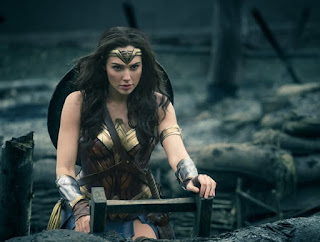Comfortable in no man's land: the pleasurable questions of Wonder Woman
'Frankly, Wonder Woman is psychological propaganda for the new type of woman who should, I believe, rule the world.’ --William Moulton Marston (the original creator of Wonder Woman)
I enjoyed director Patty Jenkins' Wonder Woman in part because the movie begs several questions that I've been brooding on, such as why did the filmmakers choose the first World War for its story and not some more recent period?
Why is the battle scene where Wonder Woman climbs up from a trench and takes on a classic stalemated no man's land the strongest one in the movie? How does Wonder Woman resist superhero blockbuster fatigue? I don't usually care much for heightened characters with unrealistic CGI-driven powers. How is it that Gal Gadot's version of a superhero almost makes her superpowers beside the point? What is the relationship between Wonder Woman's mythological origin/worldview (with its emphasis on Ares, Zeus, Hippolyta, etc.,) and the more historical one of Steve Trevor (Chris Pine)? Even as naked and bathing Steve Trevor describes himself as being an "above average" specimen of mankind, is he even needed in this movie? When Wonder Woman decides to go find and fight Ares as a way to stop war, is she being naive or somehow smarter than Steve?
When we see Robin Wright playing Antiope as Diana Prince's fighting coach on Paradise Island, are we supposed to see her work here as some fundamental opposition to her usual role as the conniving Claire Underwood in the much more cynical House of Cards? How much is the success of Wonder Woman due to its lack of cynicism? When Steve Trevor (Chris Pine) faints underwater after crash landing his plane near Paradise Island, is he meant to look weak and helpless before waking to find an Amazon staring at him on the beach and saying "A man!" somewhat like Miranda does in Shakespeare's The Tempest when she beholds her first man: "How beauteous mankind is, Oh brave new world," etc.? When Wonder Woman rather whimsically decides to climb the ladder and start running toward a machine gun nest across no man's land, are we supposed to think of hundreds of thousands of men being nihilistically slaughtered in movies such as Gallipoli (1981) and Paths of Glory (1957)? Does it help somehow that the movie doesn't have Nazis, so that one can also associate this movie with Jean Renoir's more sympathetic portrait of the Germans in Grand Illusion (1937)?
Wonder Woman is an ideological opposition to male dominance in a svelte package, an oddly compassionate goddess-woman who can scarcely see a wounded war veteran without wanting to do something about it. I'm not sure how it works. Perhaps Jill Lepore's book can help explain things. At any rate, Diana Prince proves refreshing as an antidote to stupid masculine oppression everywhere.
Related links:
---"Top Ten Things About Wonder Woman" by Anthony Lane
---"Jenkins sets her “Wonder Woman” in the First World War instead of the Second, and, in a way, this makes a certain chronological sense, since the Marston family’s models were the formidable women who fought for suffrage, equal rights, and birth control in the nineteen-teens and twenties." --Jill Lepore
Related links:
---"Top Ten Things About Wonder Woman" by Anthony Lane
---"Jenkins sets her “Wonder Woman” in the First World War instead of the Second, and, in a way, this makes a certain chronological sense, since the Marston family’s models were the formidable women who fought for suffrage, equal rights, and birth control in the nineteen-teens and twenties." --Jill Lepore




Comments